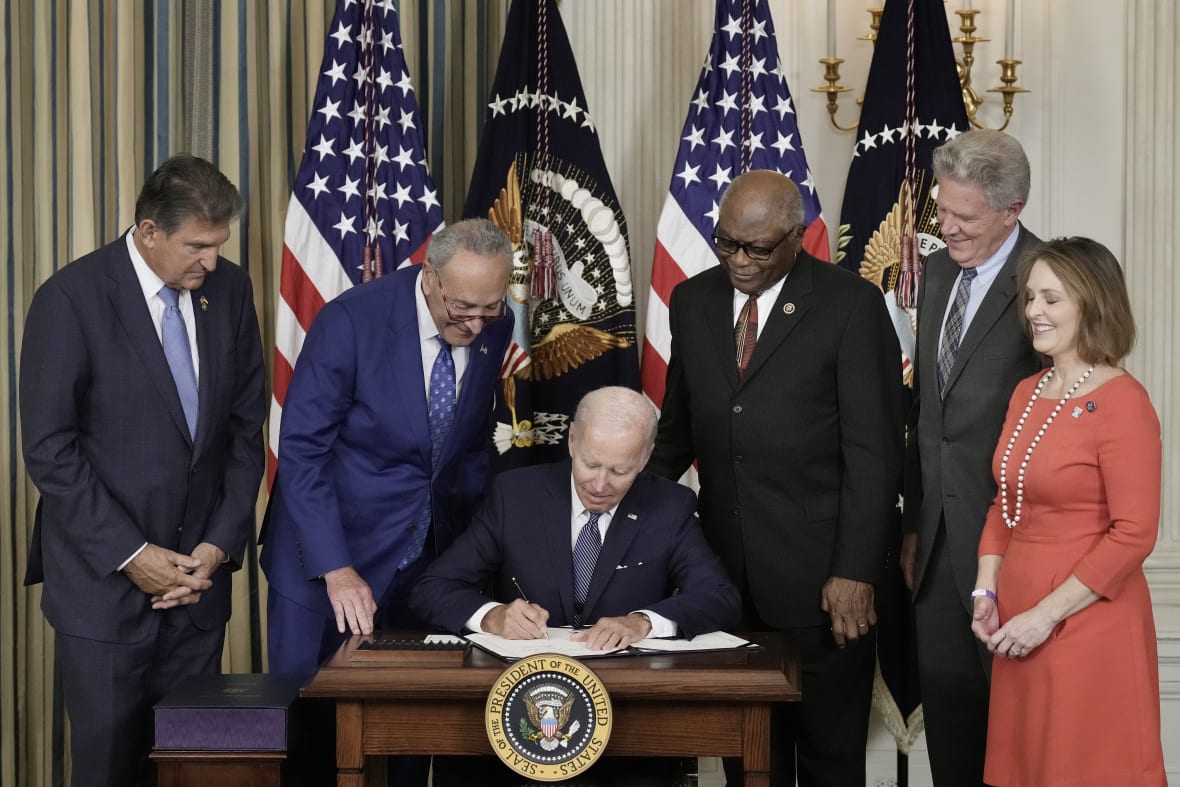A coalition of environmental and justice organizations is calling on President Joe Biden to go beyond his historic investments to combat the climate crisis and do what is necessary to “heal historical harms” levied against Black, brown and indigenous communities.
The Inflation Reduction Act, which Biden signed into law in August 2022, provides a historic $369 billion in funds toward his signature climate policy. Investments range from tax credits to purchase electric vehicles to building wind turbines and solar panels and subsidizing the cost for American households to transition away from fossil fuels and into clean, renewable energy.

Despite the first-of-its-kind investments in combating the climate crisis and the Biden-Harris administration’s assessment that it would reduce greenhouse gas emissions 40% below 2005 levels in 2030, advocates warn it’s still insufficient.
Kaniela Ing, national director of the Green New Deal Network, told theGrio that far more investments are needed to avert an increasingly warming planet and a potential economic collapse due to the cost of climate change evidenced by frequent natural disasters.
“It doesn’t even get us halfway there,” Ing said of the provisions in the Inflation Reduction Act to decarbonize the earth. He added, “If you look at what the U.S. should be morally accountable for – given our decades of pollution – it represents about 3% of the investments we need.”
The Green New Deal Network says the United States should be spending at least $1 trillion a year to meet the moment. The 50-state coalition represents 15 organizations, including Movement for Black Lives, MoveOn, Sunrise Movement, Greenpeace and the Working Families Party. The climate activists were instrumental in getting the Biden-Harris White House and Congress to include many of the climate provisions in the IRA.
However, there is much more that advocates would like to see from elected officials in Washington, including more investments to restore Black, brown and indigenous communities that American policies and neglect have historically harmed.
“We know that there are still millions of lead pipes that are killing people that didn’t make it in the budget,” said Ing, “There’s a lot of projects like mass transit projects that didn’t get funded that’s needed.”
The former Hawaii state legislator said that while the Inflation Reduction Act funds important clean energy projects like electrifying school buses, for example, “it’s going to require a lot of work to actually get up to scale.”
He described the act as a “down payment to the Green New Deal we need,” but added, “It doesn’t take us all the way there.”
In April, Rep. Alexandria Ocasio-Cortez, D-N.Y., and Sen. Ed Markey, D-Mass., reintroduced the Green New Deal Resolution, which calls on lawmakers to solve the intersectional challenges of the climate crisis. During a press conference, the members of Congress acknowledged the shortcomings of the IRA, including supporting sustainable and affordable housing and health and racial justice.
Ing told theGrio that continuing to diversify the Green New Deal advocacy movement is key to building on-the-ground support to compel the Biden-Harris administration and Congress to do more on climate and environmental justice.
“For generations, the environmental movement has been too siloed, and it’s been led by a lot of white folks who aren’t experiencing these traumatic events in the same way that our communities might,” he said.
The organizer added, “It’s up to us to show President Biden that we’re still here and … you can’t take for granted the base that got you elected to come out again.”
In recent weeks, Biden and members of his administration have been traveling across the country for their Investing in America tour, highlighting the investments from the Inflation Reduction Act and other landmark legislation investing in domestic manufacturing. A major selling point of its climate investments by Biden-Harris officials has been the clean jobs being created.
Ing said part of the Green New Deal Network’s strategy is to show Americans that the act “actually works for our people” so Biden “is incentivized to invest even more in his second term.”
The climate justice leader commended the president for being a “master at bipartisanship” throughout his first term but said that for him to meet his campaign promise to build a “modern and sustainable economy that prioritizes working families,” he’ll need to “think bigger.”
“The president needs to go beyond the bipartisan compromises that his record is based on so far,” Ing told theGrio. “He talks a lot about likening himself to [President Franklin D. Roosevelt]. Well, Roosevelt moved forward without bipartisanship in the beginning.”
He noted that the success of FDR’s New Deal resulted from the support of a coalition of community and labor groups.
“If he can build that coalition, then he can move forward without that bipartisanship,” said Ing, “because bipartisanship for bipartisanship’s sake — when our economy could collapse in 20 years because of climate change — isn’t the legacy that I imagine President Biden wants to have.”
In the meantime, the Green New Deal Network plans to mobilize on the ground between now and the 2024 elections to ensure Americans across the country understand what the IRA’s climate provisions “could mean for communities.”
The network is launching a Green New Deal tour this fall after the Biden-Harris administration wraps its Investing in America tour. The advocates hope to knock on millions of doors.
Ing said they will also be meeting with members of Congress, “doing direct actions to hold them accountable.”
“We could walk you a thousand roses, or we can name and shame you,” he exclaimed. “Depends on how responsive you are to the community.”
Ultimately, Ing said he’s “really optimistic” that Biden is going to “heed the call” of climate advocates but emphasized, “it’s really up to us as the movement to make sure he does.”
Gerren Keith Gaynor is a White House Correspondent and the Managing Editor of Politics at theGrio. He is based in Washington, D.C.
TheGrio is FREE on your TV via Apple TV, Amazon Fire, Roku and Android TV. Also, please download theGrio mobile apps today!

